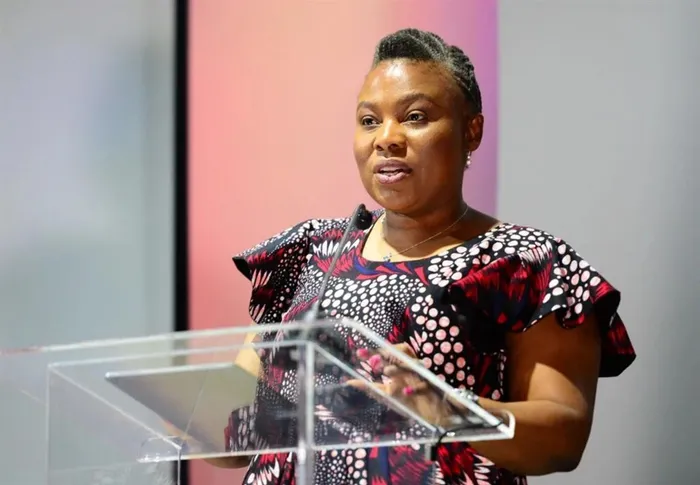Extending the diesel rebate to telecoms is an investment in SA’s future

Nomvuyiso Batyi is the CEO of the Association of Comms and Technology. Photo: Supplied
By Nomvuyiso Batyi
There is no sound reason to continue to exclude telecommunications from the Diesel Fuel Tax Rebate system which was always intended to protect the competitiveness of key industries in South Africa.
The rebate system was originally set up in 2000 to assist important domestic producers who were also significant users of off-road diesel. The system works by refunding a portion of Road Accident Fund and fuel levies to those who are covered by the system.
As load shedding has worsened other sectors like telecommunications and food retailers have been forced to become large users of diesel to power generators to keep key services going.
For telecommunications, the spend has run into billions of rand over the past two years as the network operators fire up generators to keep connectivity – and the critical digital economy – functioning while retailers are keeping stores open and the cold chain secure with significant investments of their own.
The Association of Comms and Technology (Act) has been lobbying the National Treasury to consider extending the rebate to our sector. With the Medium-Term Budget Policy Statement on November 1, Finance Minister Enoch Godongwana can do the right thing and extend relief to the telecommunications sector which plays a significant role in the South African economy.
Act is not alone in pushing for telecommunications to be covered by the rebate scheme. Our arguments find support from independent experts like those in respected companies like Deloitte’s.
Olebogeng Ramatlhodi, a director and Indirect Tax leader at Deloitte’s Africa, has argued that government should consider broadening the system to include critical industries that are using higher than usual amounts of diesel to deal with load shedding.
As we have highlighted before, the telecommunications industry expects to spend more than R1.1 billion on diesel to counter load shedding in 2023, in the face of record high stages of load shedding which has seen some 19 794 gigawatt hours shed by early September. The comparable figure for diesel for the sector last year was some R843 million.
Ramatlhodi argues that extending the scheme would improve the liquidity and profitability of companies and would help to preserve jobs while Phozi Mbiko, a senior manager for customs and excise at Deloitte Africa, says telecommunications should be considered for relief because the industry uses diesel to maintain connectivity, a critical economic activity, during load shedding.
“In the wake of the increasing levels of load shedding that South Africa is currently experiencing, other industries are losing billions in revenue due to the inability to operate without electricity. This has led to some companies in industries not included in the diesel refund system benefit, making significant investment in procuring diesel to operate generators,” says Mbiko.
Deloitte argues that the more frequent load shedding occurs and the longer it lasts, the more diesel the companies must consume to continue to operate and contribute to the country’s gross domestic product.
The telecommunications sector, data from the Independent Communications Authority of South Africa shows, employed some 34 000 as of last year while the most recent Statistics South Africa data shows that industry’s contribution to the total value added in the country’s economy stood at 2.4% in 2020, roughly similar to agriculture which enjoys the diesel rebate benefit.
Revenue in the telecommunications sector reached R208bn last year but Statistics South Africa data shows precipitously declining profit margins for the sector from 29.2% in 2010 to only 1.1% in 2019.
The pressure is exacerbated by load shedding costs and impacts the fiscus by reducing tax revenues.
Notwithstanding the pressures, the telecommunications industry has contributed more than R14bn directly to the fiscus via the successful auction of spectrum to enable the roll-out of 5G technologies which are anticipated to have material impacts on economic growth.
The diversion of spending to maintain networks during load shedding hampers those efforts too, despite the large capital expenditure by networks to obtain spectrum.
The impact of load shedding on 5G cannot be overstated. This is technology which could be a powerful economic catalyst opening new opportunities in health, education, manufacturing and elsewhere.
To date, about 20% of the population is covered by 5G but the industry has only until 2028 to achieve the government’s goal of universal coverage, a target seriously undermined by current challenges.
With the fuel levy, which is impacted by the rebate system generating nearly R90bn for the fiscus in the last financial year, the government, which is watching every rand it is spending and receiving, might be tempted to play it safe on the diesel rebate. But we would argue this is a false economy.
Deloitte’s Phozi Mbiko, a senior manager, argues that if successfully administered to more beneficiaries, declines in fuel levy contributions can be recovered through more taxes from companies that remain profitable and who continue to grow despite the infrastructural challenges and general headwinds faced by the economy.
The telecommunications sector has amply demonstrated its role in keeping the South African economy alive in the face of some of the greatest challenges the country has faced and it has shouldered the costs of maintaining connectivity when the power goes out.
It is time for the government to acknowledge this is a sector no less important to South Africa’s future than mining or agriculture. And the best way to acknowledge that reality practically is by extending the rebate so the sector might continue to drive our economic future.
Nomvuyiso Batyi is the CEO of Association of Comms and Technology.
BUSINESS REPORT